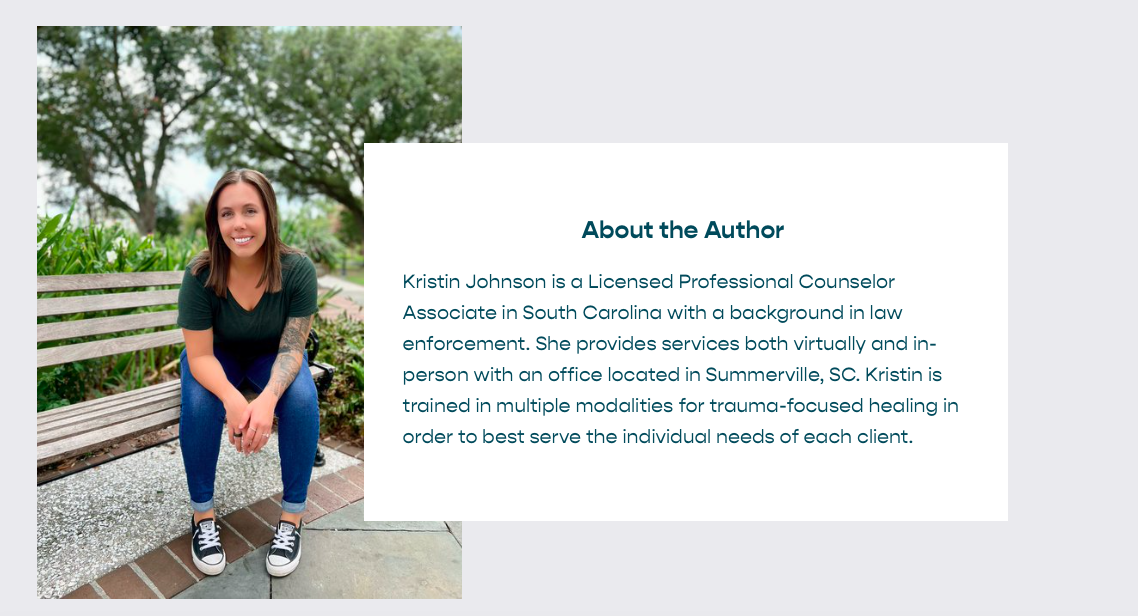Breaking the Stigma: Therapy for First Responders
Let’s be honest, first responders can be pretty badass. You know what's not badass though….being in a position where you need therapy, and not being willing to get the help you need. We all know that there's this long-standing stigma in the world of first responders that asking for help is a sign of weakness. You might hear things like, “We’re supposed to be the ones who help others, not the ones who need help ourselves.” It’s this mindset that keeps so many first responders from seeking therapy. And if I'm being completely honest, I had the same ridiculous mindset when I was a cop, so I can't really blame anyone else for thinking that way. But now that I have more knowledge and experience after being in the mental health industry for the last few years, I have a much better understanding of just how much the experiences on the job can negatively impact your mental health.
Why Therapy for First Responders Matters
First responders face a unique set of challenges. You see and experience things that most people can’t even imagine, and honestly things that people shouldn't ever have to experience. Trauma becomes a regular part of your life, whether it’s responding to a horrific accident, dealing with a fire, or showing up at the scene of a crime. It becomes so "normal" that you don't even realize that it is actually trauma. And while you’re out there saving lives, solving problems, and taking care of other people's shit, the mental and emotional toll starts to add up.
Therapy offers a safe space to process all of that—the things you’ve seen, the things you’ve felt, and the things you’re still carrying around (and yes you are still carrying things around, you just don't want to admit it). It’s not about sitting in a circle and sharing your feelings (although if that’s your jam, go for it). It’s about sitting down with a culturally competent therapist and letting them give you tools you need to be able to cope, heal, and move forward without letting the job fuck you (and your family) up.
Breaking the Stigma
For first responders, admitting you’re struggling can feel like admitting defeat. But here’s the thing—therapy isn’t about being broken or weak. It’s about being human. The truth is, you can only compartmentalize for so long before the boxes start to overflow. Maybe it shows up as anger, snapping at your spouse or kids over something small. Maybe it’s the nightmares that won’t let you sleep. Or maybe it’s that feeling of numbness, like you’re just going through the motions without really living. Whatever it looks like for you, you deserve relief. I wish I knew the secret to breaking this stigma. If I had to guess, I would say a step in the right direction would be more of a willingness to talk about mental health and the impact on first responders. At what point are we going to stop giving a shit what other people think about us prioritizing our own well-being?
Therapy for First Responders
If you’ve never been to therapy, you might be picturing some guy with a clipboard asking, “How does that make you feel?” I do everything imaginable to avoid asking that question. Sometimes it really is a valid question though!! There are so many different approaches to therapy and each therapist has their own style. I personally utilize EMDR a lot in my practice. EMDR (Eye Movement Desensitization and Reprocessing) is a type of therapy that’s particularly effective for trauma. It helps you reprocess painful memories so they don’t keep popping up like an unwanted guest at a party.
I would argue that the most important thing for a first responder is to make sure you find a therapist that is culturally competent. What does that mean? Good question, I'm glad you asked. Culturally competent means someone who is legitimately qualified to work with first responders. AKA someone who isn't going to cry or get traumatized when they hear the shit that comes out of your mouth. Therapy is a place where you can be honest without worrying about being judged. Want to vent about your job? Go for it. Need to process something you saw last week? This is the place. Therapy isn’t about fixing you because you’re not broken. It’s about giving you the tools to handle the job and life in a healthier, more sustainable way.
Final Thoughts
Look, I get it. As someone with a background in law enforcement, I’ve been there. I’ve seen the culture, the pressure to tough it out, and the “I’m fine” mentality (even when you’re clearly not fine). But here’s the thing: You don’t have to carry it all on your own. Therapy isn’t about weakness; it’s about strength. It’s about having the courage to say, “I can’t keep doing this on my own,” and taking the steps to take care of yourself.
So, if you’re on the fence about therapy, consider this your sign. You deserve support, just like the people you show up for every day. Because at the end of the day, even a badass needs help sometimes.
Looking to connect with a therapist who specializes in therapy for first responders?
Take the first step towards breaking the stigma
(South Carolina residents only)


